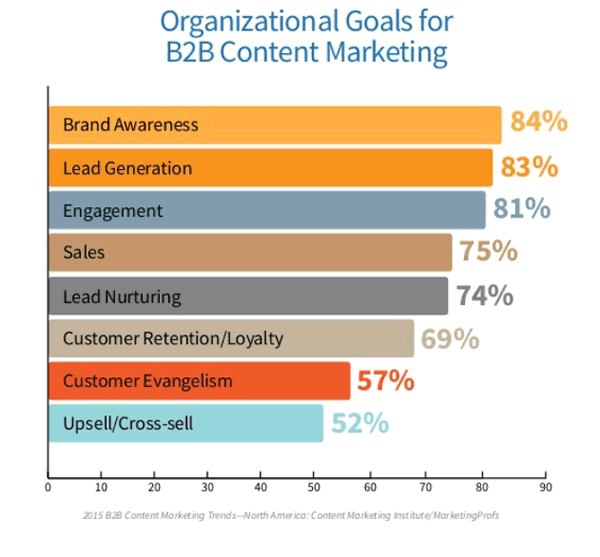Content marketing should help you attract leads and drive sales. In Content Marketing Institute’s 2015 B2B Content Marketing Benchmarks, Budgets and Trends study, 83% of B2B marketers say that lead generation is an important content marketing goal. The report also says that a majority of content marketers try to drive sales and lead nurturing.

Aligning your content strategy in a way that helps sales, however, doesn’t happen by accident. It requires a thoughtful process and a deep knowledge of your customers and the sales process. It also requires constant improvement to make sure your content marketing efforts continue to be effective.
Here are three tips on how to use content marketing to help your sales team get more leads and close more deals faster.
1. Work closely with sales.
The worst mistake content marketing teams could make is working in a silo. Creating content without the input of sales is a recipe for content that doesn’t convert.
The solution is simple: talk to your sales people. Since they talk to prospects every day, your sales team provides critical insight about your content strategy.
Content marketing should help solve the problems of your prospects. So together with sales, figure out the challenges your prospects and target market face. From there, you can use blog posts, reports and other types of content to address those issues. When your content is useful for prospects, you’re more likely to attract them and to get them as leads.
In collaboration with sales, use content to make the sales process smoother. For example, ask sales about the type of objections they’re getting and brainstorm how your content could help address those objections.
Sales can play a significant role beyond the content-creation step. Don’t hesitate to get sales input on your drafts, for instance, so they could help improve your content. And once your content is released, sales can tell you how it resonated with your prospect—giving you anecdotal insight on how you can improve in the future.
2. Think beyond the top of the funnel.
When people talk about content marketing, they usually think of blog posts. But while blogging is an important part of your content strategy, it’s not the only content type you should focus on.
To be effective, marketing teams should be thinking about the entire sales funnel when crafting their content strategy. Create content that sales could use at every step of the process. Arm sales with cheat sheets, product info sheets and other materials they could leverage when talking with prospects. Case studies can also help sales illustrate the value of your products and services in a very tangible way.
When done strategically, content can help move the sales along. Content marketing shouldn’t be just about brand awareness and lead generation.
3. Measure the success of your content.
So you’ve created useful content to help your sales team—but how do you know those content pieces were successful? Getting feedback from sales is critical, but you shouldn’t stop there. If you want to measure the true performance of your content, it helps to go straight to the source: your prospects and customers. Looking at analytics can help.
Most content marketers focus on page views when measuring the success of their campaigns. The most popular way of measuring content marketing success is website traffic, according to Content Marketing Institute’s report. But that’s problematic because website stats alone don’t tell the whole story.

For example, if you’ve written a blog post or a comprehensive guide on a topic, how do you know which sections resonated with your readers? Website stats alone can’t tell you that. You might need to use heat mapping tools like Crazy Egg to better understand where people are clicking and where they’re stopping to read more info. Or say you’ve created a very useful info sheet for your sales team. How do you know if prospects have opened it, or whether they actually read the content? Using tools that provide more granular data is critical. Tools like Orangedox can provide page-by-page PDF analytics and give you specific information on how well your content is performing.
Content marketers and sales pros should be BFFs!
The best content marketers know that their ultimate goal is to drive business results. That can only happen when marketers maintain an open communication with the sales team—by working with them closely in the full content-creation process.
This article was syndicated from Business 2 Community: How to Use Content Marketing to Help Your Sales Team
More Sales & Marketing articles from Business 2 Community:




